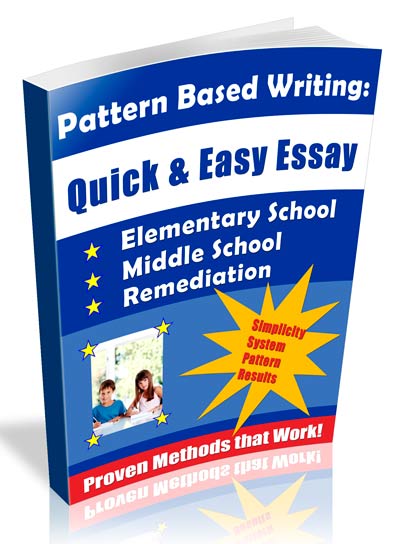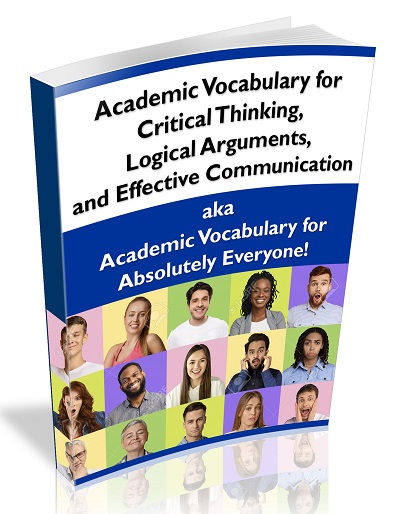In Lee Child’s Jack Reacher books, logical and calculating Reacher famously says, “Details matter.” Reacher does not say “supporting details” matter. He doesn’t say that because he means that the details matter—the specifics matter. Calling all details supporting details is doing the opposite of what Reacher is suggesting. Not all details are supporting details.
Supporting details has become a generic term embedded in paragraph instruction for far too long. There is nothing wrong with the term if you actually mean supporting details—a detail that provides support. However, “support” has a specific meaning in writing. The short version is that support means to back up or substantiate. We can build on that definition with these terms.
Types of Support: Evidence, proof, corroboration, confirmation, verification, and explanation.
Of course, many statements of all types need support because our readers won’t fully believe us or understand if we don’t provide support in the form or more details. In fact, people often feel as if they have to back up everything they say. So, I am aware that we are dealing with semantics here. This is why an explanation can be support even when it should be just details—or better yet, an explanation.
However, consider these two main ideas or topic sentences.
- XYZ Corp. recently closed its Arizona factory.
- I went to the dentist and got a cavity filled.
Neither of those sentences requires support. Would anyone ever say, “Can you provide support for that? Can you back that up with support?” No. If those sentences are the first sentence in a paragraph, what follows will likely be the details or the specifics. Teachers may say, “Tell me the details. What are the specifics? Why is that important or interesting?” Now, students will know what to write!
When you ask students to supply supporting details for sentences like those, they get it but are also confused. There is a disconnect. Something you are saying does not make sense, but they just don’t know what it is. As a new teacher using the standard paragraph terminology, I also felt at the gut level that there was something wrong with many of the paragraph terms, but I couldn’t explain it.
Generic Paragraph Terminology vs. Specific Paragraph Terminology
Both generic and specific paragraph terminology have a place in teaching writing. Let’s take a look.
1. Generic Paragraph Terms: These terms teach general principles. The problem is that many of these principles are not how real writers create paragraphs, especially when considering different genres, occasions, and audiences. Examples: Main idea, topic sentence, detail, support, supporting detail, concluding sentence, elaboration, etc.
2. Specific Paragraph Terms: Teachers usually enter the world of specific terminology when teaching particular genres. Examples: Claim, evidence, fact, reason, sensory detail, explanation, description, cause, prediction, suggestion, benefit, advantages, etc.
Both sets of terms can cause problems and confusion. However, both sets of terms are also helpful and necessary.
If you wish to improve the vocabulary you use to teach writing, check out 250 Plus Types of Ideas for Creating Powerful, Logical, and Effective Writing. That’s a precise vocabulary. If you wish to transform how you think about writing, along with improving your logical and rational thought, be sure to check out Academic Vocabulary for Critical Thinking, Logical Arguments, and Effective Communication.
Generic Terms: A Better Terminology: Support, The Details, and The Specifics
Please note that I am not promoting a specific vocabulary here. Every teacher must discover the best vocabulary for their students. However, I will explain why the term supporting details harms paragraph instruction. But first, please read this carefully.
1. Support: What is support? It’s evidence, proof, corroboration, confirmation, verification, or explanation. Do you consider evidence or proof to be details? They can be, but they are usually more than simply details. They are support—and support is essential for claims. In short, I recommend that teachers start thinking of support as support—something that backs up or substantiates. We can use the terms support, supporting sentences, supporting evidence, and even supporting details. Worth mentioning, the word support implies it’s attached to something specific, usually a claim. In a practical sense, claims are anything we feel we need to back up.
2. The Details or the Specifics: Tell me more! The details or the specifics are further narration, description, or explanation of a leading sentence. What would follow the two examples sentences above? Answer: The details or the specifics in the form of narration, description, or explanation.
Please note that I’m not dogmatic about terms because there is no perfect terminology system. However, I urge teachers to stop using supporting details as a generic term for all details. Ironically, it’s acceptable to casually call support the details or the specifics—as with the details or specifics of the case. Support can be details.
Semantics: The Words We Use When Teaching Paragraphs
For years, I was not satisfied with what I taught students about paragraphs. I was not satisfied because it didn’t work as it should have if it were true. In short, I became an effective writing teacher because of how I taught writing, not because of what I taught students about paragraphs. It’s fair to say that I became an effective writing teacher despite what I taught about paragraphs.
Here are a few of the traditional paragraph instruction words.
Generic Paragraph Instruction Words: Main idea, topic sentence, detail, support, supporting detail, concluding sentence, elaboration, etc.
Please note that I am only against one term on that list.
On the other hand, the terms main ideas and topic sentences are not without their own problems. In theory, a topic sentence is a sentence that explicitly states the main idea. The reality is that studies show that in professional writing, the main ideas are implied about half the time. To some degree, readers must infer or construct the main ideas in their minds at least half the time. Put another way, readers infer or construct the topic sentence half the time. Remember, only about half of paragraphs have a true topic sentence. I’m serious! Read the research on topic sentences and main ideas!
Example: A paragraph vividly describes the downward spiral of a fast-moving degenerative disease. Does a highly skilled writer need to state the obvious point? What if the writer does know best and doesn’t want to for various reasons? In reality, the point of that paragraph is probably stated clearly or implied in multiple paragraphs and is probably closely connected to the thesis statement. Furthermore, that paragraph may make several nuanced points that are similar or different but equally important. That’s how real writing works. Every paragraph is just a part of the whole composition. You may wish to read Why Doesn’t Every Paragraph Have a Topic Sentence? The Truth!
Reading instruction would be easy if professionally written paragraphs followed the traditional paragraph rules. If they did, teachers would probably be using the paragraphs in their textbooks as example paragraphs. Why don’t they? They don’t because those paragraphs don’t follow the rules they teach. And for that reason, they don’t understand how they are constructed. In reality, many teachers can’t explain how most of the paragraphs in their textbooks are built.
The truth is that many first sentences of paragraphs simply function as door openers. Everything else in the paragraph flows from or is a continuation of that door opener. For the most part, the only true topic sentences are claims. Claims always state the main idea.
In short, you won’t get far in teaching writing with that basic paragraph vocabulary. Be sure to check out 250 Plus Types of Ideas for Creating Powerful, Logical, and Effective Writing for hundreds of different types of main ideas, details, and support.
If you are serious about becoming a highly successful writing teacher, check out these two resources:
1. Pattern Based Writing: Quick & Easy Essay: Teach your students how to get ideas and organize ideas to create excellent stories, reports, essays, and articles quickly and easily. This program is the fastest, most effective way to teach clear and organized paragraph and multi-paragraph writing… Guaranteed!
2. Academic Vocabulary for Critical Thinking, Logical Arguments, and Effective Communication: The reality is that the quality of your ideas will reflect the quality of your thinking. This Academic Vocabulary program will revolutionize how you and your students think, write, argue, and communicate.
The Improper Use of “Supporting Details” in Writing Instruction
You will need to do some Google searches to understand how the term supporting details is used in writing instruction. Once again, if your supporting details actually support the main idea, then the term is fine. Remember, support backs up or substantiates something.
Somewhere along the line, people got confused about the meaning of support. Support has many more definitions, but those definitions don’t relate to writing. Here are a few of them:
1. Support (verb): To keep from falling; to uphold; to prop up; to bear the weight of; as, the trunk of a tree supports the branches; the walls of a house support the roof.
2. Support (verb): To encourage; to defend; as, to support a friend emotionally; to support someone’s decision.
3. Support (verb): To provide for; as, to support a family.
Although these definitions don’t relate to writing, people have used these definitions to turn supporting detail into a generic term that applies to all details.
If you Google search images for “paragraph supporting details house” you will see many pictures of a so-called paragraph house. In this paragraph house, the supporting details hold up the roof to keep it from falling down. You can also Google search “paragraph supporting details” to find other similar examples that are flat-out wrong. The reason that the examples are problematic is that the details usually don’t support the main idea. Let’s look at our two sentences again.
- XYZ Corp. recently closed its Arizona factory.
- I went to the dentist and got a cavity filled.
Do the details or specifics that follow from those sentences keep them from falling, hold them up, or prop them up—like how the walls of a house support the roof? No. Providing more detail or specifics is not support. Why does this matter?
It’s a metaphor! I know. The examples and pictures make sense on the surface as an analogy or metaphor. Still, the cost is that they destroy the meaning of the word support, a foundational concept in logical and rational thinking and all forms of argument.
Examples: The Proper Use of Support
Support is one of the more critical concepts in logical and rational thinking and all forms of argument. We shouldn’t confuse students by telling them that all details are supporting details. These example sentences illustrate what support is.
1. The evidence supports the author’s claim.
2. The analysis and research support our decision.
3. The eyewitness accounts support her version of events.
4. The facts, reasons, and evidence support the writer’s thesis statement.
A Final Note: Why There Is No Perfect Terminology
Doesn’t this look like an excellent terminology system for an argument? Can you spot the problem?
1. Claim: We must protect the green-shelled snails.
2. Reason: If we don’t, the ecosystem will collapse.
3. Evidence: A recent study shows that green-shelled snails are critical for many aspects of the ecosystem.
The problem is that the REASON is also a CLAIM. Although the evidence primarily supports the REASON/CLAIM, it also supports the MAIN CLAIM. Furthermore, we could easily add DETAILS for any one of those sentences. Point being: Sentences in a paragraph interact and relate to each other in complicated ways that defy rigid classification.
In Conclusion: Try to be accurate but not dogmatic. Teach a large and effective writing vocabulary by using Academic Vocabulary for Critical Thinking, Logical Arguments, and Effective Communication!




